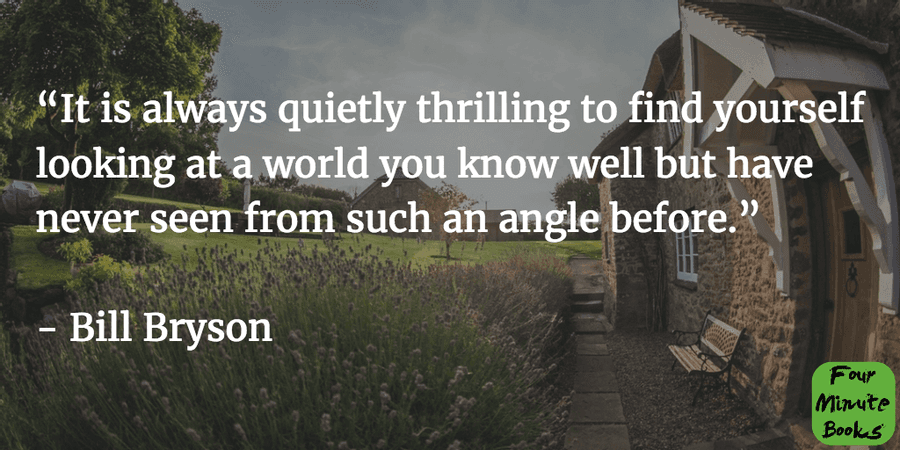At Home Summary
Curated from: fourminutebooks.com
Ideas, facts & insights covering these topics:
17 ideas
·204 reads
2
Explore the World's Best Ideas
Join today and uncover 100+ curated journeys from 50+ topics. Unlock access to our mobile app with extensive features.
Author Quote
"It is always quietly thrilling to find yourself looking at a world you know well but have never seen from such an angle before."
-Bill Byrson
4
26 reads
At Home - Book Summary
At Home takes you on a tour of the modern home, using each room as occasion to reminisce about the history of its tradition, thus enlightening you with how the amenities and comforts of everyday life you now take for granted have come to be.
4
18 reads
Book Overview
Bill Bryson is the megastar of curious, inquisitive, entertaining writing. Whatever the topic, he manages to make it come to life for the reader, as if he or she was the one doing all the exploring. A Short History Of Nearly Everything revealed a few mind-blowing facts about the universe and showed me even more reasons to be grateful than I already knew were out there.
4
12 reads
At Home is a historic sketch of “private life” – you know, what happens behind those precious four walls we all call home. Bill takes you on a tour of his house, telling a story in each room about how it grew into the purpose we know and use it for today.
4
11 reads
Top 3 Book Lessons
- Fighting harder for longer: food didn’t come easily until very recently.
- Rodents and rings made sleep much less regenerative 100 years ago.
- There are two very different reasons why there’s a salt and a pepper shaker on every kitchen table.
Are you in for a different kind of house tour? Forget MTV Cribs, this is the real deal!
4
14 reads
Lesson 1: The struggle for food lasted longer than You Think.
You know the neanderthals had a tough time filling their stomachs. Hunting, gathering, learning what’s edible and what’s not through trial and error. These were tough times, no doubt. I have to admit though, that in my mind, somewhere around the 1600s, making sure you ate 2-3 times a day “must have become fairly easy.”
Ha! I could not have been more wrong.
4
14 reads
Easy access to food is predicated on one thing: making it preservable . This process didn’t even start until the late 1700s. A confectioner from Paris, Nicolas Appert , was the first to try and can foods, sealing them in containers made of glass with a wax seal. However his seals weren’t really airtight, so the food could still be contaminated.
4
13 reads
Bryan Donkin improved upon his concept, even launching the first commercial iron tin cannery, but wrought iron cans were heavy and almost impossible to open. Some even came with instructions to open them with hammer and chisel, and soldiers, well, they just shot the cans open with their rifles!
4
10 reads
The first true relief at scale came with the invention of the can opener as we know it today : in 1925.
What none of this accounts for is that people rarely knew with certainty what they were eating, as food labeling has been required by law only since 1990 (!). Chalk was added to milk, dirt to tea and sand to sugar, to get more money out of less product. We now live in good times!
4
9 reads
Lesson 2: Today's Sleeping Problems May Not Be As Bad
Today, mattresses are stuffed mainly with either springs or foam, and sometimes with a bladder filled with air or water. None of these were invented until the early 1900s – so what did people put into their beds before?
Oh, all kinds of stuff: straw, feathers, horse hair, cotton, even sea moss and sawdust. Those were all pretty natural, but you know what nature attracts? Animals!
4
11 reads
Bedbugs, moths, mice, rats and other rodents were all too common companions while trying to get some shut-eye back then . When not all rustling beneath the sheets was of the good kind , you did well to keep a shoe close by, in case you needed to strike.
4
12 reads
Speaking of reproductive activities, they were considered a mere practical act back then. Having kids was good, but having fun while conceiving them? Nah-uh. Women were told to avoid board games and reading, as those could arouse them, and since masturbation was also considered filthy and unhealthy, men had to keep their hands to themselves too.
4
10 reads
Lesson 3: Salt to survive, pepper ’cause it’s popular
Have you ever thought about why, of all spices, salt and pepper are the one on every kitchen table?
Salt might be easy to guess, after all, it’s crucial for human bodies to function . And even though we’ve only known that for a comparatively short time, we’ve been consuming salt for thousands of years . Some ancient, indigenous people went as far as drying urine to extract it. For many kings, amassing lots of salt was also a sign of power.
4
9 reads
However, there was one condiment with which it was even easier to show how wealthy and mighty you were: pepper . Originally popularized by the ancient Romans, who couldn’t get enough of this stuff, prices reached crazy heights even back then. At one point, they offered an invading army as much as 3,000 pounds of pepper as a peace agreement.
4
9 reads
At Home - Book Review
The summary of At Home was refreshing. When you have an “I want to learn something new, something totally unrelated, but no idea what” moment, this is the one to grab. Everything we take for granted today was once a life-changing innovation. It’s important to not forget and this surely will help you remember.
4
9 reads
Who would I recommend the At Home to?
The 16 year old who’s too lazy to warm her frozen food when mum isn’t home, the 43 year old hotel guest, who regularly complains to the staff how “hard” his mattress is, and anyone who never asked why salt and pepper always show up together.
4
9 reads
IDEAS CURATED BY
CURATOR'S NOTE
At Home - Book Summary
“
Tom Joad's ideas are part of this journey:
Learn more about food with this collection
How to choose the right music for different tasks
The benefits of listening to music while working
How music affects productivity
Related collections
Similar ideas
15 ideas
The Richest Man In Babylon Summary
fourminutebooks.com
20 ideas
An Invisible Thread Summary
fourminutebooks.com
16 ideas
Breakfast With Socrates Summary
fourminutebooks.com
Read & Learn
20x Faster
without
deepstash
with
deepstash
with
deepstash
Personalized microlearning
—
100+ Learning Journeys
—
Access to 200,000+ ideas
—
Access to the mobile app
—
Unlimited idea saving
—
—
Unlimited history
—
—
Unlimited listening to ideas
—
—
Downloading & offline access
—
—
Supercharge your mind with one idea per day
Enter your email and spend 1 minute every day to learn something new.
I agree to receive email updates

